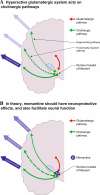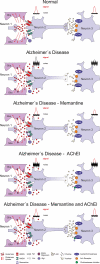Memantine and cholinesterase inhibitors: complementary mechanisms in the treatment of Alzheimer's disease
- PMID: 23657927
- PMCID: PMC3753463
- DOI: 10.1007/s12640-013-9398-z
Memantine and cholinesterase inhibitors: complementary mechanisms in the treatment of Alzheimer's disease
Abstract
This review describes the preclinical mechanisms that may underlie the increased therapeutic benefit of combination therapy-with the N-methyl-D-aspartate receptor antagonist, memantine, and an acetylcholinesterase inhibitor (AChEI)-for the treatment of Alzheimer's disease (AD). Memantine, and the AChEIs target two different aspects of AD pathology. Both drug types have shown significant efficacy as monotherapies for the treatment of AD. Furthermore, clinical observations indicate that their complementary mechanisms offer superior benefit as combination therapy. Based on the available literature, the authors have considered the preclinical mechanisms that could underlie such a combined approach. Memantine addresses dysfunction in glutamatergic transmission, while the AChEIs serve to increase pathologically lowered levels of the neurotransmitter acetylcholine. In addition, preclinical studies have shown that memantine has neuroprotective effects, acting to prevent glutamatergic over-stimulation and the resulting neurotoxicity. Interrelations between the glutamatergic and cholinergic pathways in regions of the brain that control learning and memory mean that combination treatment has the potential for a complex influence on disease pathology. Moreover, studies in animal models have shown that the combined use of memantine and the AChEIs can produce greater improvements in measures of memory than either treatment alone. As an effective approach in the clinical setting, combination therapy with memantine and an AChEI has been a welcome advance for the treatment of patients with AD. Preclinical data have shown how these drugs act via two different, but interconnected, pathological pathways, and that their complementary activity may produce greater effects than either drug individually.
Figures




References
-
- Albin RL, Greenamyre JT. Alternative excitotoxic hypotheses. Neurology. 1992;42:733–738. - PubMed
-
- Albrecht M, Rammes G, Gravius A, Parsons CG (2008) Memantine reverses β-amyloid oligomers-induced deficits in long-term potentiation (LTP) in murine hippocampal slices. Poster presented at 38th Society for Neuroscience Annual Meeting, Nov 15–18, Washington, USA
-
- Atri A, Sherman S, Norman KA, Kirchhoff BA, Nicolas MM, Greicius MD, Cramer SC, Breiter HC, Hasselmo ME, Stern CE. Blockade of central cholinergic receptors impairs new learning and increases proactive interference in a word paired-associate memory task. Behav Neurosci. 2004;118:223–236. - PubMed
Publication types
MeSH terms
Substances
LinkOut - more resources
Full Text Sources
Other Literature Sources
Medical
Research Materials

